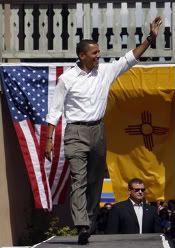Cross-posted from Progressive-Independence.org.
From an article by John Browne at Asia Times:
Last week, US Treasury secretary Henry Paulson and Federal Reserve chairman Ben Bernanke faced congressional leaders with a reported forecast that we are “literally days away from a complete meltdown of our financial system”. Apparently, the politicians were stunned into a long silence.
If citizens across the country could glimpse the horror seen by the congressmen (of which we have long warned), then widespread panic would truly be the order of the day. In particular, people will be shocked to see how Paulson’s seemingly vast request to congress for some $1 trillion is utterly dwarfed by the likely problem.
Later in the article:
If the economy moves into a severe recession and then depression, default rates will explode. These, in turn, will cause stock markets to implode, as they did in 1929. In addition, the US dollar is likely to plummet, driving up the trade deficit in the longer term. Considering these factors, many of which the government prefers to hide, things look bad – very bad.
The thing is, most Americans seem to oppose any bailout of Wall Street whatsoever. U.S. Senator Dianne Feinstein was inundated with communications from constituents demanding that she vote against giving any of their tax dollars to Wall Street, according to the Kansas City Star:
Feinstein’s office has heard from about 50,000 constituents since Congress began considering a financial rescue plan about a week ago – and “only one of a thousand supports it – whatever it is,” the California Democrat said.
Lawmakers from both parties reported similar confusion and concern among constituents as they spent their Saturday painstakingly, and sometimes painfully, trying to craft a still-elusive compromise package.
Senate Majority Leader Harry Reid and Republican Leader Mitch McConnell aimed to have a final plan ready by 6 p.m. Sunday, in time for the opening of markets around the world.
But House Republicans, whose objections derailed a deal reached last week, warned they did not want any rush to judgment.
And:
The senator tends to side on most issues with Democratic liberals and moderates, but her feedback from home was similar to what conservatives were hearing. “People call us and say they’re really against bailing out fat-cats. That’s a big issue,” she said.
“We’ve heard from hundreds of people who say, ‘We pay our bills. Why can’t Wall Street pay theirs?’ ” said Rep. Kay Granger, R-Texas.
Sen. Bob Corker, R-Tenn., said his office had received 3,500 calls in recent days “and just 95 said they supported what we’ve done so far.”
Republicans have apparently been revolting against their own party’s dictator in the White House, seemingly out of a desire to finally look as though they oppose big government interference in the market system – earlier this month, the feds took lending giant Fannie Mae back under their control and also seized its counterpart, Freddie Mac.
Whether this is really the case is up for debate; it could all be a ploy to extend the financial crisis so as to force Democrats in Congress to cave in and write another blank check. My gut, however, tells me there’s genuine fear that a bailout not crafted to give taxpayers at least partial ownership of the financial institutions in return for a bailout would create a massive backlash at the polls come November.
At any rate, once the bailout does go through (no matter what form it takes), shall it be enough? According to at least one American economics writer and the foreign press, we’re already in the throes of an economic depression that began months ago. Considering the massive U.S. debt already being passed on to an incalculable number of future generations, adding another trillion or so dollars to it doesn’t seem as though it’ll solve the problem we now face.

